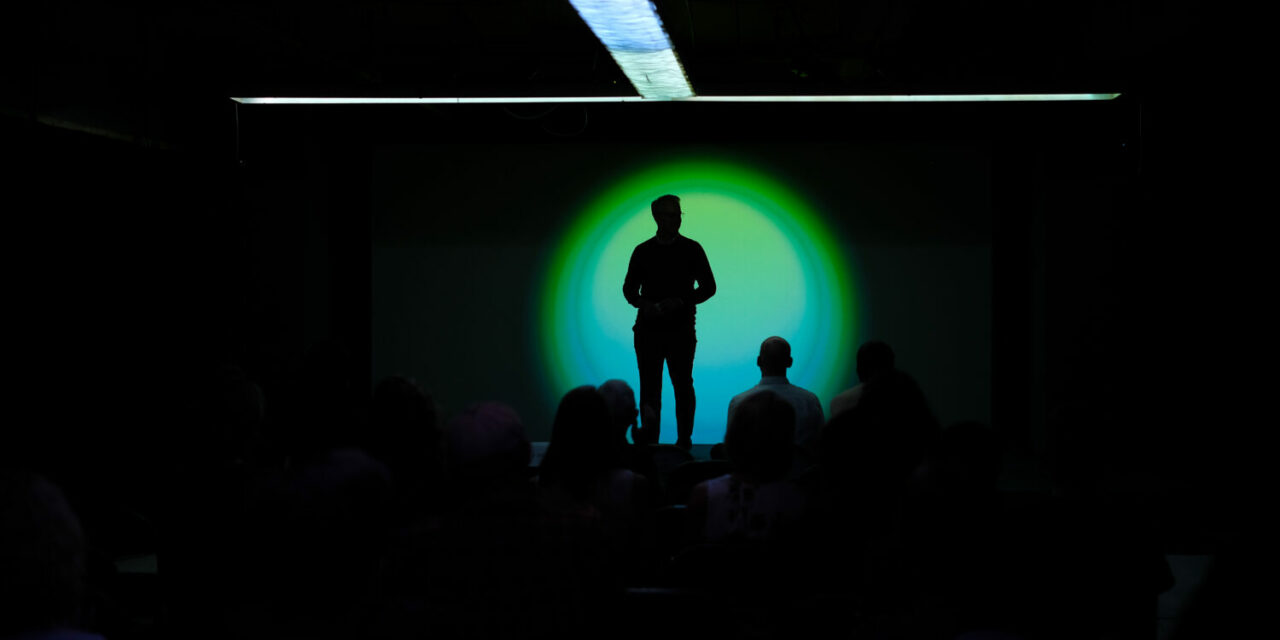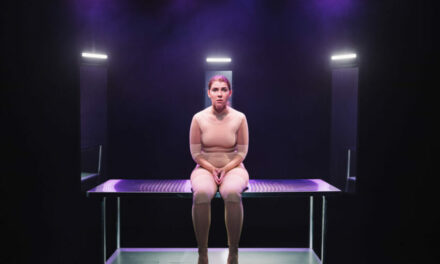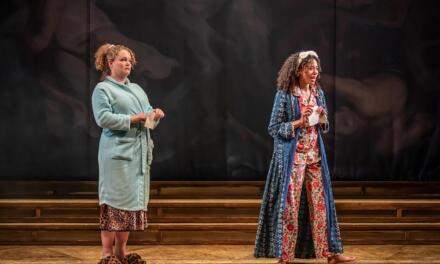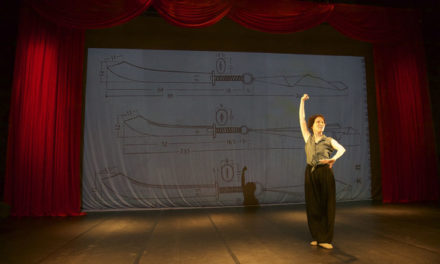Do you know where your data is?
I sure don’t. But I’ve been thinking about my data – and the companies that mine it – a lot since I journeyed through Bricolage’s newest immersive experience, “Project Amelia,” which uses the fictive launch of breakthrough artificial intelligence technology to open thorny ethical questions about privacy and data rights.
Before participating in “Project Amelia,” you are invited by “Aura’s” marketing director Bo Brunfeld (Carrie Tongarm) to fill out a survey about yourself and your thoughts about technology. Your answers (may or may not) determine how you are interpellated into the corporate event around which the evening’s action swirls. Before entering the space, you are equipped with a phone and a bracelet, both of which allow your data to be collected and tracked during the evening; these also assign you an identity – you might be cast as a board member or investor, as a VIP friend of one of the company’s principles, as a member of the press, or anyone of a number of other roles. A short video orients each subgroup of audience members to its goals and objectives; as in the real world, who you are here determines not only what you are tasked with doing, but also what you know and don’t know.
The immersive world – stunningly realized by Bricolage collaborators Jeffrey Carpenter, Jorge Cousineau, Tami Dixon, Micha Gorelick, Olivia O’Connor, Michael Warren Skirpan, and a small army of architectural consultants, designers, and engineers – resembles a slick, Silicon Valley-esque tech environment, complete with a sly in-house “Museum of Failures” and a “Sandbox” full of intriguing new interactive AI technology that represents the leading edge of the fictional company “Aura’s” product lineup. The big announcement of the evening is the company’s game-changing breakthrough in AI – a lifelike humanoid machine named Amelia (Jocelyn Wrzosek) that is not only capable of performing intricate physical tasks, but also able to parse through the wealth of a person’s data to assess how to best to assist them in times of psychological or emotional need. Amelia is also, we are promised, able to handle that data in an ethical and responsible manner.
Or is it? The evening’s adventure begins when a disgruntled former scientist on the project (Courtney C. Jenkins) interrupts the product launch with some inflammatory accusations. From that point on, the subsequent action seems largely in the hands of audience-participants: there are seven unique trajectories for the action, and the evening’s resolution depends wholly on the choices members of each audience subgroup make in response to the requests and hints they receive from the characters, all of whom need help either procuring or suppressing damning information.
Imagine a cross between a CYOA video game, a scavenger hunt, an escape room, and a hands-on science museum, and you have something of the vibe of “Project Amelia.” It’s both chaotic and energizing, and you may find yourself swept up in – and distracted by – the search for answers and documents. Yet as “Amelia” proves to be in fact much less stable and trustworthy than promised, the fictive “product launch” also comes to offer a sobering warning about our not-too-distant future. For when the action ends and the security personnel usher you toward the exits, you are suddenly made aware that not only have they been keeping dibs on you in person, but that also the electronic devices you were assigned at the beginning of the evening have been collecting your data all along. Bricolage ethically offers you the option to either erase it or let them keep it for future research.
The rest of your data? That’s still out there – somewhere – and someone is using it. Do you trust them? Should you?
This article was originally posted in The Pittsburgh Tatler on 1 October 2019, and has been reposted with permission.
This post was written by the author in their personal capacity.The opinions expressed in this article are the author’s own and do not reflect the view of The Theatre Times, their staff or collaborators.
This post was written by Wendy Arons.
The views expressed here belong to the author and do not necessarily reflect our views and opinions.


















